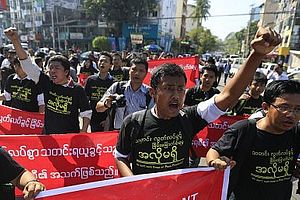In a rare protest, several Myanmar newspapers and journals blacked-out their front pages on April 11 after a provincial court sentenced a video reporter to one year in prison for trespassing and disrupting the work of a government official.
The case involved Zaw Pe, a multimedia reporter of the Democratic Voice of Burma (DVB), who was accused of trespassing an education department office in central Myanmar while reporting about a Japanese-funded scholarship program in 2012. It is difficult not to sympathize with Zaw Pe since his alleged crime of disrupting the duties of a civil servant took place during office hours. How can a media interview constitute disruption?
For Toe Zaw Latt, bureau chief of DVB, the case negates the government boast about the supposed rise of press freedom in the country.
“These are not good signs for press freedom, if journalists have to face a lawsuit for covering news during office hours. We are worried that these actions might be a sign of restrictions in press freedom again, as it was in the past,” he said.
But it was not just the bizarre charge that pushed the Myanmar Journalist Network to organize the “black page” protest. The bold move was also intended to call for the release of five journalists who have been detained since December on various spurious cases.
Last year, Eleven Media reporter Ma Khine was charged with trespassing and the use of abusive language in connection to a news expose about judicial corruption. Meanwhile, the CEO and four reporters of the weekly Unity Journal are still in prison and refused bail after they reported allegations of secret chemical weapons production. According to government prosecutors, the report undermined national security and violated a colonial-era law, the Official Secrets Act.
The Irrawaddy, one of the local media groups that spearheaded the protest, described the jailing of reporters as a worrying throwback to the dark days of dictatorship: “President Thein Sein’s promise to lift censorship and uphold press freedom rings hollow. Reforms in Burma have stalled, if not reversed. We call on the government to immediately free all reporters in custody.”
This was echoed by Shawn Crispin of the Committee to Protect Journalists. He warned that the “once-promising democratic reform program (of the government) is rapidly being reversed.”
Indeed, an important phase in Myanmar’s transition toward modern democracy is the abolition of censorship and repressive media regulation. When the government finally removed its notorious censorship board, this was praised by global media groups. But journalists continued to face harassment suits as obsolete laws remain in effect.
Many politicians still expect the media to be less critical when reporting about controversial government policies. This attitude was revealed in a public forum when Deputy Information Minister and presidential spokesperson U Ye Htut lambasted foreign journalists for their coverage of ethnic tensions in Rakhine State.
Without belittling the reforms undertaken by the government, it must be underscored that the political situation in Myanmar is still hostile to a free and independent press.
The Eleven Media group succinctly explained how censorship persists in the post-Junta rule: “Myanmar journalists have to practice the self-censorship by themselves although they no longer need to submit their works for censorship before publishing. A reporter may go to jail anytime for his or her reporting. There are too many laws that authorities can use to control the freedom of expression. But there are hardly any laws to protect the freedom of expression for the journalists.”
But despite these challenges, the “black page” protest also means that Myanmar journalists are ready to defend and assert their rights.

































